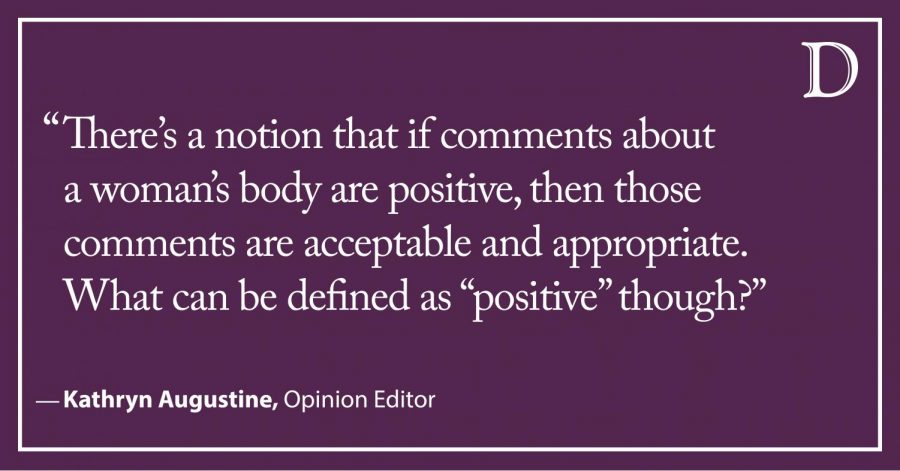Augustine: Stop talking about Adele’s body
May 21, 2020
My immediate reaction to photos documenting dramatic weight loss is concern. As someone who has struggled with an eating disorder, I wonder if the weight was shed in a healthy manner, if the individual’s eating and exercise habits are sustainable, if they are engaging in any maladaptive behaviors.
While I recognize that weight loss is not necessarily problematic or indicative of disordered eating, I refrain from commenting. I know that I cannot accurately predict how my comments about someone’s body will be interpreted and remembered. And ultimately, I don’t want to participate in a culture that fixates on body shape and numbers on a scale.
That culture is inarguably pervasive. Even amidst a pandemic, American society remains hyper-focused on women’s bodies.
On May 5, Adele celebrated her 32nd birthday and posted a photo showing that she has visibly lost weight. Given that women’s bodies are under a microscope — particularly those of public figures and celebrities — her post was met with a storm of comments.
Some referred to Adele’s significant weight loss as the “glow-up of the decade” or compared her appearance to actress Sarah Paulson. Others called her “unrecognizable.”
There’s a notion that if comments about a woman’s body are positive, then those comments are acceptable and appropriate. What can be defined as “positive,” though?
The term glow-up implies a dramatic transformation from unattractive to attractive, or least more attractive. When applied to Adele, that means her attractiveness has increased as her weight has decreased. Is that a genuine compliment?
I argue that labeling Adele’s weight loss as a glow-up is a covert insult that reinforces the narrative that skinny women are the epitome of beauty. Regardless of the intention behind the comment, the underlying meaning is that skinny trumps fat.
Even for those who are adamant about sharing these “positive” comments, the question still remains: What drives the need to comment on the body of a stranger?
While some commenters may know Adele personally, I am confident that the majority do not. Adele’s body is not an art exhibit inviting analysis, awe and critique. Her body is hers. If she is not explicitly inviting an outpouring of praise or openly addressing her weight loss, then the general public has no right to do so.
Most of us don’t know her. We don’t know the specifics of her relationship with her body. Most significantly, we don’t know how she feels about her weight loss. Let’s not impose our thoughts and reactions onto her.
Kathryn Augustine is a Medill sophomore. She can be contacted at kathrynaugustine2022@u.northwestern.edu. If you would like to respond publicly to this op-ed, send a Letter to the Editor to opinion@dailynorthwestern.com. The views expressed in this piece do not necessarily reflect the views of all staff members of The Daily Northwestern.


